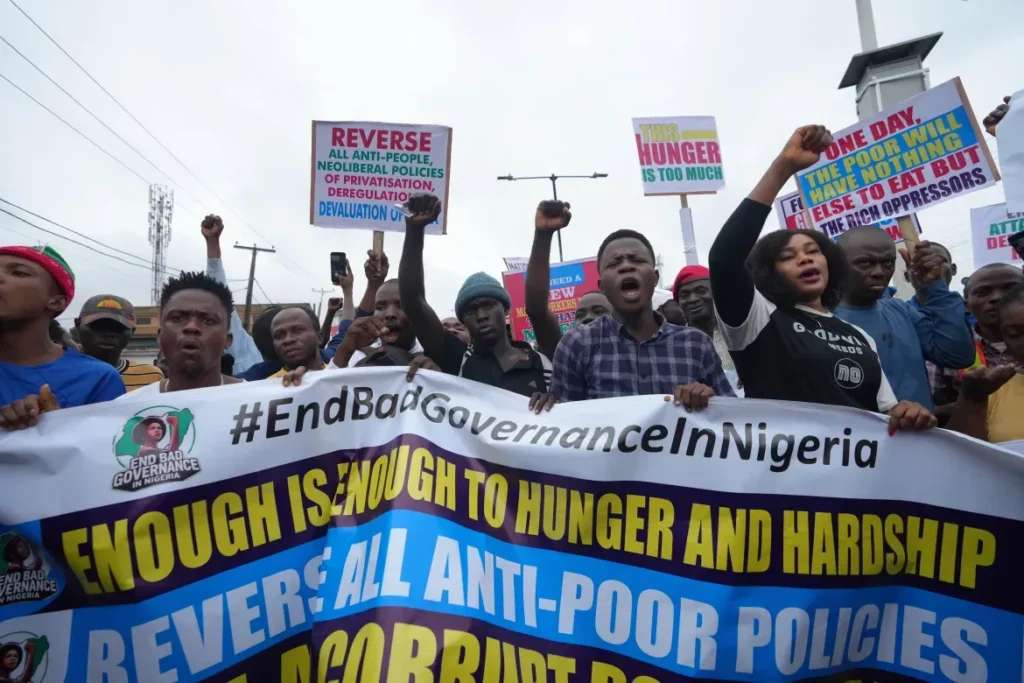In Summary
• Protesters seen wielding Russian flags during demonstrations in Nigeria
• Nigerian authorities label the act as treasonous
• Russian embassy denies involvement in influencing protests
• At least 13 reported dead as protests against economic hardship continue
LAGOS, NIGERIA– Nigeria’s ongoing protests against economic hardship have taken an unexpected turn, raising concerns about potential Russian influence in the West African nation. As demonstrations persist across several states, the appearance of Russian flags among protesters has sparked controversy and drawn sharp reactions from Nigerian authorities.
The protests, which began last Thursday, are in response to Nigeria’s worst cost-of-living crisis in a generation, exacerbated by surging inflation and government economic policies that have weakened the local currency. At least 13 people have reportedly died in the demonstrations, which have faced accusations of excessive force from security forces.
In a surprising development, some protesters have been seen waving Russian flags during demonstrations in various states. This act has been swiftly condemned by Nigerian authorities, with the country’s military chief, Christopher Musa, labeling it as treasonous. Following a meeting with President Bola Tinubu, Musa stated that such actions would be treated as treason against Nigeria’s sovereignty.
The Russian embassy in Nigeria has been quick to distance itself from these events. In a statement, the embassy denied any responsibility for the appearance of Russian flags, asserting that the flags represent personal choices of the protesters and “do not reflect any official position or policy of the Russian Government.”
Despite President Tinubu’s call for an end to the demonstrations on Sunday, protests have continued. The president met with security chiefs in Abuja on Monday, and a curfew was declared in the northern Kaduna state – the sixth state to implement such a measure since the protests began.
The economic crisis fueling the unrest is marked by inflation at a 28-year high and controversial government policies that have pushed the Nigerian naira to record lows against the dollar. While President Tinubu has expressed commitment to addressing citizens’ concerns, critics, including the Lagos-based SBM Intelligence research firm, note that he has yet to provide a concrete plan to tackle the issues.
The appearance of Russian flags at the protests is particularly significant given the growing pro-Russian sentiments in parts of West Africa. In recent years, several countries in the region have welcomed Russian involvement, especially in cases where military coups have led to severed ties with Western nations. Nigeria’s northern neighbor, Niger, for instance, has recently chosen Russia as a new security partner after asking French and American troops to leave.
President Tinubu has warned protesters not to allow themselves to be used by “enemies of democracy” to promote an unconstitutional agenda. This warning comes as Nigeria currently holds the rotational chairmanship of West Africa’s regional bloc, ECOWAS.
In response to the flag incident, Nigeria’s secret service reported the apprehension of tailors in northern Kano state, allegedly responsible for making Russian flags being distributed in the area. An investigation into this matter is ongoing.
The controversy surrounding the Russian flags adds a complex geopolitical dimension to Nigeria’s domestic unrest. It highlights the delicate balance the country must maintain in its international relations while addressing pressing internal economic challenges.
As the protests continue and the government grapples with both the economic crisis and the potential implications of foreign influence, the coming days will be crucial in determining Nigeria’s path forward. The situation underscores the interconnected nature of domestic policy, economic stability, and international relations in an increasingly complex global landscape.
https://www.africanexponent.com/russian-flags-at-nigerian-protests-spark-controversy/


